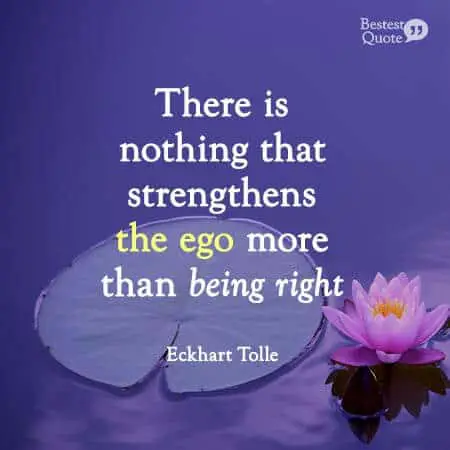Are you on a spiritual journey and would like to be free from your ego and your mind?
The human ego is often mistaken as “I” or self-esteem. According to renowned spiritual teacher Eckhart Tolle, the ego exists in all of us once the mind identifies with things, people, relationships, time, a social identity, an image, ideas and mental positions, etc. and is the cause of all suffering, depression, negativity and conflicts. The problem is so serious that he described it as “rapidly taking the [human species] to the brink of disaster.”
Based on his best-selling works “The Power of Now” (1997) and “A New Earth” (2005), we have collated his most inspiring quotes regarding the definition of the ego and how to be free from the mind for your journey to enlightenment.
Table of Contents
Definition of the Ego
– Criticism, Being Right and Complaining
1. “There is nothing that strengthens the ego more than being right.”

2. “Fear seems to have many causes. Fear of loss, fear of failure, fear of being hurt, and so on, but ultimately all fear is the ego’s fear of death, of annihilation. To the ego, death is always just around the corner. In this mind-identified state, fear of death affects every aspect of your life. For example, even such a seemingly trivial and “normal” thing as the compulsive need to be right in an argument and make the other person wrong – defending the mental position with which you have identified – is due to the fear of death.”
3. “Being right is identification with a mental position – a perspective, an opinion, a judgement, a story. For you to be right, of course, you need someone else to be wrong, as so the ego loves to make wrong in order to be right.”
4. “Through being ’right’, you feel superior and through feeling superior you strengthen your sense of self. In reality, of course, you are only strengthening the illusion of ego.”
5. “The word enlightenment conjures up the idea of some superhuman accomplishment, and the ego likes to keep it that way, but it is simply your natural state of felt oneness with Being.”
6. Complaining is one of the ego's favorite strategies for strengthening itself. Eckhart Tolle Click To Tweet
7. “The ego tends to equate having with Being: I have, therefore I am. And the more I have, the more I am. The ego lives through comparison. How you are seen by others turns into how you see yourself.”
8. “Ego is an immature stage of development for humans, and that’s what it will be recognized as when the consciousness changes on the planet. Children will develop an ego and quickly outgrow it. That’s very different from developing an ego and being stuck with it for the rest of your life.”
9. “The way in which you perceive the other is determined by your own thought forms.”
10. “Thinking, or more precisely identification with thinking, gives rise to and maintains the ego, which, in our Western society in particular, is out of control. It believes it is real and tries hard to maintain its supremacy.”
Related: Watch the teachings of Eckhart Tolle on his channel
– Identification with External Things, Past and Future
11. “As long as the egoic mind is running your life, you cannot truly be at ease; you cannot be at peace or fulfilled except for brief intervals when you obtained what you wanted, when a craving has just been fulfilled. Since the ego is a derived sense of self, it needs to identify with external things. It needs to be both defended and fed constantly.”
12. “The most common ego identifications have to do with possessions, the work you do, social status and recognition, knowledge and education, physical appearance, special abilities, relationships, personal and family history, belief systems, and often also political, nationalistic, racial, religious, and other collective identifications. None of these is you.”
13. “If you identify with a mental position, then if you are wrong, your mind-based sense of self is seriously threatened with annihilation. So you as the ego cannot afford to be wrong. To be wrong is to die. Wars have been fought over this, and countless relationships have broken down.”
14. “Very unconscious people experience their own ego through its reflection in others. When you realize that what you react to in others is also in you (and sometimes only in you), you begin to become aware of your own ego.”
15. The ego doesn't know that the source of all energy is within you, so it seeks it outside. Eckhart Tolle Click To Tweet
16. “Not all thinking and all emotion are of the ego. They turn into ego only when you identify with them and they take you over completely, that is to say, when they become “I.””
17. “Whatever the ego seeks and gets attached to are substitutes for the Being that it cannot feel.”
18. “Ego is no more than this: identification with form, which primarily means thought forms.”
19. “Ego-identification with things creates attachment to things, obsession with things, which in turn creates our consumer society and economic structures where the only measure of progress is always more.”
20. “To the ego, the present moment hardly exists. Only past and future are considered important. This total reversal of the truth accounts for the fact that in the ego mode the mind is so dysfunctional. It is always concerned with keeping the past alive, because without it – who are you?”
21. “Humanity is reaching the end of the evolutionary stage of ego. The closer we get to the end, the more dysfunctional humanity becomes.”
22. “There is a wonderful ancient Sufi saying which I’m going to paraphrase slightly. It says, ‘When the heart weeps for what it has lost,’ in this case ‘heart’ means ‘ego,’ ‘when the heart weeps for what it has lost, the spirit rejoices for what it has found.’
23. The most common ego identifications have to do with possessions, the work you do, social status and recognition, knowledge and education, physical appearance, special abilities, relationships, person and family history, belief… Click To Tweet
Related: Follow Eckhart Tolle on Twitter
– Jealousy
24. “If you have a strong ego [and] something good happens to an acquaintance of yours, [it] makes you feel bad. It’s called envy.”
25. “The ego thinks something has been taken away from you because somebody else has received something good. It’s a complete illusion, but that’s the madness of the ego.”
Resistance of the Mind
26. “The ego says, ‘I shouldn’t have to suffer,’ and that thought makes you suffer so much more. It is a distortion of the truth, which is always paradoxical. The truth is that you need to say yes to suffering before you can transcend it.”
27. “Resistance is weakness and fear masquerading as strength. What the ego sees as weakness is your Being in its purity, innocence, and power. What it sees as strength is weakness.”
28. The ego is not only the unobserved mind, the voice in the head which pretends to be you, but also the unobserved emotions that are the body’s reaction to what the voice in the head is saying.
29. Know that the ego isn't personal. It isn't who you are. If you consider the ego to be your personal problem, that's just more ego. Eckhart Tolle Click To Tweet
Related: Dalai Lama’s Quotes on Happiness
Ego and Self-Esteem
30. ”In essence, you are neither inferior nor superior to anyone. True self-esteem and true humility arise out of that realization. In the eyes of the ego, self-esteem and humility are contradictory. In truth, they are one and the same.”
31. ”The image that I have of myself as the very capable person or whatever it is that I’m trying to uphold, if I encounter criticism, the ego immediately will be hurt. And so a shy person would not dare to say anything because they’re afraid of ego loss. And.. sometimes that’s mistaken for an egoless person.”
32. “Deep down inside the shy person or this person who is suffering from this sense of inferiority, there’s the desire, the unexpressed desire to be superior. And inside the person who acts superior who seems to have a big confident ego, is always the hidden fear that he might be inferior. And his whole acting out is to compensate for that hidden fear of being inferior.”
33. Whenever you feel superior or inferior to anyone, that's the ego in you. Eckhart Tolle Click To Tweet
34. “If you’re shy, then what you fear is to be found wanting … you’re afraid of the disapproval or the criticism, [which] would represent an injury of your… sense of self, which is the ego.”
35. “The world would say he or she has high self-esteem. People who have big egos. But the world doesn’t realize that that’s not true self-esteem. True self-esteem goes much deeper. It’s finding the source of power and aliveness deep inside. We talked about the lake. Realizing that within the depth of your being, there is that continuous source of intense aliveness and power, which is the stillness out of which everything comes.”
See also: Quotes about Quiet People
How to Let Go of Ego
36. “Give up defining yourself — to yourself or to others. You won’t die. You will come to life. And don’t be concerned with how others define you. When they define you, they are limiting themselves, so it’s their problem. Whenever you interact with people, don’t be there primarily as a function or a role, but as the field of conscious presence.”
37. “See if you can catch the voice in your head, perhaps in the very moment it complains about something, and recognize it for what it is: the voice of the ego, no more than a thought.”
38. “Whenever you notice that voice, you will also realize that you are not the voice, but the one who is aware of it. In fact, you are the awareness that is aware of the voice. In the background, there is the awareness. In the foreground, there is the voice, the thinker. In this way you are becoming free of the ego, free of the unobserved mind.”
39. “You cannot fight against the ego and win, just as you cannot fight against darkness. The light of consciousness is all that is necessary. You are that light.”
40. ”When you accept everything for what it is without labels you are outside of your ego.”
41. “The ego isn’t wrong; it’s just unconscious. When you observe the ego in yourself, you are beginning to go beyond it.”
42. “If you are content with being nobody in particular, content not to stand out, you align yourself with the power of the universe.”
43. “What looks like weakness to the ego is in fact the only true strength. This spiritual truth is diametrically opposed to the values of our contemporary culture and the way it conditions people to behave.”
44. “Don’t take the ego too seriously. When you detect egoic behavior in yourself, smile. At times you may even laugh.”

45. ”The decision to make the present moment into your friend is the end of ego.
46. ”There have been many people for whom limitations, failure, loss, or pain in whatever form turned out to be their greatest teacher. It taught them to let go of false self-images and superficial ego-dictated goals and desires. It gave them depth, humility and compassion. It made them more real.”
47. ”Non-reaction to the ego in others is one of the most effective ways not only of going beyond ego in yourself but also of dissolving the collective human ego.”
48. “If no one will listen to my sad story, I can tell it to myself in my head, over and over, and feel sorry for myself, and so have an identity as someone who is being treated unfairly by life or other people, fate or God. It gives definition to my self-image, makes me into someone, and that is all that matters to the ego.”
49. “Suffering has a noble purpose: the evolution of consciousness and the burning up of the ego.”
50. “Whenever there is negativity in you, if you can be aware in that moment that there is something in you that takes pleasure in it or believes it has a useful purpose, you are becoming aware of the ego directly. The moment this happens your identity has shifted from ego to awareness. This means the ego is shrinking and awareness is growing.”
51. “The ego is sustained by continuous resistance.”
52. The moment you become aware of the ego in you, it is strictly speaking no longer the ego, but just an old, conditioned mind-pattern. Eckhart Tolle Click To Tweet
53. “When you let go of the belief that you should or need to know who you are, what happens to confusion? Suddenly it is gone.”
54. “When you fully accept that you don’t know, you actually enter a state of peace and clarity that is closer to who you truly are than thought could ever be.”
55. “Defining yourself through thought is limiting yourself.
56. Through allowing, you become what you are; vast, spacious. You become whole. You are not a fragment anymore, which is how the ego perceives itself. Your true nature emerges, which is one with the nature of God.
An Exercise to Diminish The Ego (video)
57. Once you have disidentified from your mind, whether you are right or wrong makes no difference to your sense of self at all, so the forcefully compulsive and deeply unconscious need to be right, which is a form of violence, will no longer be there. You can state clearly and firmly how you feel or what you think, but there will be no aggressiveness or defensiveness about it. Your sense of self is then derived from a deeper and truer place within yourself, not from the mind.
58. “Ego implies unawareness. Awareness and ego cannot coexist.”
59. “When someone criticizes you, blames you, or calls you names, instead of immediately retaliating or defending yourself – do nothing. Allow the self-image to remain diminished and become alert to what that feels like deep inside you. For a few seconds, it may feel uncomfortable, as if you had shrunk in size. Then you may sense an inner speciousness that feels intensely alive. You haven’t been diminished at all. In fact, you have expanded.” (from A New Earth)
60. “When you no longer defend or attempt to strengthen the form of yourself, you step out of identification with form, with mental self-image. Through becoming less (in the ego’s perception), you in fact undergo an expansion and make room for Being to come forward. True power, who you are beyond form, can then shine through the apparently weakened form. This is what Jesus means when he says, “Deny yourself” or “Turn the other cheek.”
61. Power over others is weakness disguised as strength. Eckhart Tolle Click To Tweet
62. Watch out for any kind of defensiveness within yourself. What are you defending? An illusory identity, an image in your mind, a fictitious entity. By making this pattern conscious, by witnessing it, you disidentify from it.
63. In the light of your consciousness, the unconscious pattern will then quickly dissolve. This is the end of all arguments and power games, which are so corrosive to relationships.
64. True power is within, and it is available to you now.
Who Am “I”? Towards Enlightenment
65. “What a liberation to realize that the ‘voice in my head’ is not who I am. Who am I then? The one who sees that.”
66. “The word enlightenment conjures up the idea of some superhuman accomplishment, and the ego likes to keep it that way, but it is simply your natural state of felt oneness with Being.”
67. You find God the moment you realize that you don’t need to seek God. Eckhart Tolle Click To Tweet
68. “If you are drawn to an enlightened teacher, it is because there is already enough presence in you to recognize presence in another.”
69. “Being an outsider to some extent, someone who does not “fit it” with others or is rejected by them for whatever reason, makes life difficult, but it also places you at an advantage as far as enlightenment is concerned.”
70. “So the single most vital step on your journey toward enlightenment is this: learn to disidentify from your mind. Every time you create a gap in the stream of mind, the light of your consciousness grows stronger. One day you may catch yourself smiling at the voice in your head, as you would smile at the antics of a child. This means that you no longer take the content of your mind all that seriously, as your sense of self does not depend on it.”
71. So the single most vital step on your journey toward enlightenment is this: learn to disidentify from your mind. Eckhart Tolle Click To Tweet
72. “Enlightenment means rising above thought, not falling back to a level below thought, the level of an animal or a plant. In the enlightened state, you still use your thinking mind when needed, but in a much more focused and effective way than before.”

